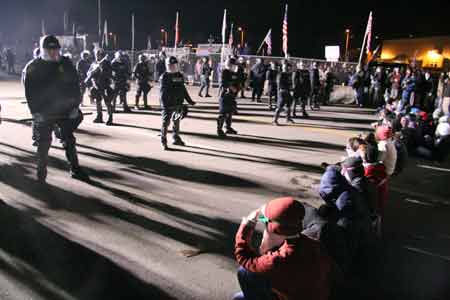|
Cartoons of
Dan McConnell
featuring
Tiny the Worm
Cartoons of
David Logan
The People's Comic
Cartoons of
John Jonik
Inking Truth to Power
|
Support the WA Free Press. Community journalism needs your readership and support. Please subscribe and/or donate.
posted Nov. 1, 2009
Olympia protesters face imminent arrest in 2007
Exonerated on the day before Halloween, defendants pose with their legal counsel.
![]()
Olympia Anti-War Protesters Celebrate Court Victory
Judge initially refuses to consider documents pointing to illegal spying on defendants, but later dismisses the charges
by Women’s Solidarity Demonstration Defense and Olympia PMR
Since the anti-war demonstrations at the port of Olympia in November 2007, a number of women have been defending themselves against misdemeanor charges in Thurston County District Court. The last eight defendants, known as the Patient Eight, celebrated victory on October 30 after the Gross Misdemeanor charge of Obstructing An Officer was dismissed, and the lesser charge of Attempted Disorderly Conduct was scheduled for dismissal on March 1.

photo copyright Robert Whitlock, used with permission
In late October, 2008, a full year after the port protests, 25 women were singled out for prosecution by Thurston County prosecutors. Since then, defendants and their attorneys have appeared in court more than 13 times over eleven months. While scaling back prosecutions of most other sorts of misdemeanors, the cash-strapped prosecutor's office has doggedly continued to pursue these charges. At the hearing on October 31 presiding Judge Sam Myers commented, “everyone's anxious to get these matters over with.”
The defendants, clad in black witches hats, circled the prosecutor, Jim Powers, and successfully negotiated the court fees down to the unusually nominal amount of fifty dollars and reduced the deferment time on the lesser charge to four months. After the agreements were signed, the women took the opportunity to speak eloquently about their experience with the court and the integrity of the Women's Demonstration. Full transcripts can be found at OlyPMR.org.
Patricia Imani and Kim Chaplin's statement read, in part, “We are proud that we stood for peace. We are proud that we said 'No' as the war machine cycled through our public ports. We are not criminals, but those who upheld the highest international laws and the highest laws of humanity. We stand for Peace only.”
Illegal Spying
The jury trial began on October 19 in Thurston County District Court, nearly seven years after the aggressive US invasion of Iraq--which is increasingly considered illegal under US and International Law--and nearly two years after the 2007 Port of Olympia protests against the Iraq War shipments.
Defense Counsel asserted that the peaceably assembled women, who were participating in a sit-in while chanting “we are non-violent”, were arrested at the order of Olympia Police Chief Tor Bjornstad, who was acting based on misleading communications from Department of Defense (DoD) intelligence received in the previous weeks.
Arrests of the women, as well as the charges filed against them, were based on information provided to the Olympia Police Chief Bjornstad by a DoD US Army civilian intelligence employee. The DoD employee, John J. Towery, was recently exposed for spying illegally on civilian anti-war peace groups in the South Sound region associated with port protests.

First indication of illegal DoD surveillance of the protesters came through reports prepared by Chief Bjornstad, provided in standard discovery documents, in which Bjornstad reported he had attended meetings at the US Coast Guard offices in Seattle in preparation for local police response to potential protests.
Defense attorney Lawrence Hildes later learned, through a Freedom of Information Act search initiated by Olympia IWW union members, that Chief Bjornstad was recipient of numerous communications sent by the Department of Defense during the 2007 Olympia Port Protests. Hildes had requested electronic and written documents tied to the Protests as part standard discovery process, but prosecutor Powers had denied their existence.
'Fusion Center' Involvement
Other news was yet more troubling to the defense. Through redacted e-mails released by the city following public records requests by the daily newspaper The Olympian, it was learned that lead prosecutor Jim Powers, who stepped up to personally try these misdemeanor cases for the city, was recipient of redacted emails marked “Law Enforcement Sensitive” sent by Ken Rivers, Region 3 Analyst with the Washington Joint Analytical Center (WJAC).
WJAC is a regional "Fusion Center," an information gathering and dissemination network funded largely by the Department of Homeland Security. Fusion Centers are being scrutinized recently by the press and the US civil rights legal community, in large part because the networks can escape accountability regarding violation of civil rights protections by maintaining an indefinable hierarchical structure.
The networking products of the Fusion Centers have, in effect, enabled Department of Defense espionage and policing of civilians--something expressly forbidden by the US Posse Comitatus Act.
Following prosecutor Powers’ refusal to confirm the existence of such communications, defense attorney Hildes subpoenaed appropriate DoD officials. Those subpoenaed were not forthcoming.
Frustrated and nearing trial, on October 8 Hildes pleaded with Thurston County District Court Judge Sam Meyer for a continuance [delay] of the trial date until all discovery documents were supplied.
Prosecutor Powers at that point confirmed the existence of certain discovery documents while denying relevance of the documents to the case.
Judge Meyers denied the defense’s request for continuance, choosing not to order the production of documents by the state, instead stating he would not permit testimony from the state that relied on information from such documents.
Where the arrests and prosecution of citizens involved in the exercise of their First Amendment rights are in fact prompted by information obtained from illegal spying, as it applies in these cases, the defense found this ruling especially problematic, and possibly leading to a violation of defendant’s due process rights.


